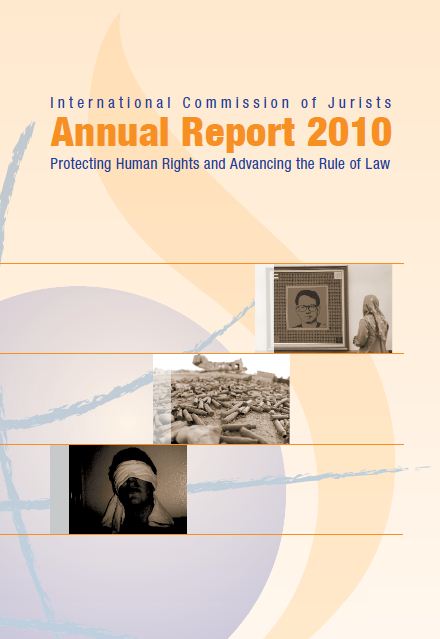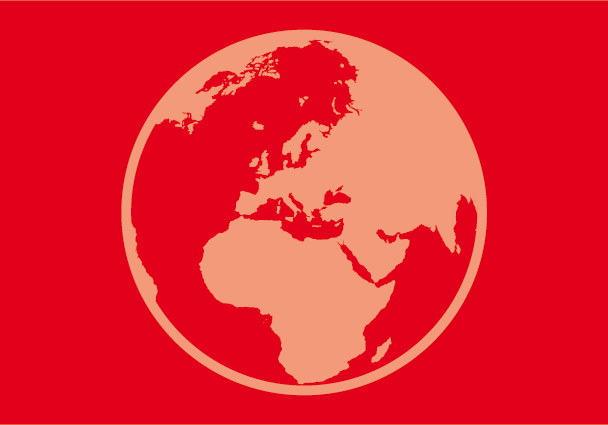 The ICJ presents its Annual Report for 2010.
The ICJ presents its Annual Report for 2010.
Introduction by Wilder Tayler, ICJ Secretary-General
2010 has not been an easy year. Looking back I am particularly grateful to the committed Commissioners and Staff of the ICJ, many of whom have done their share and more to provide support in what has been a transitional period, ensuring that the organisation retained momentum in its work for human rights and rule of law. Thankfully there have also been some rewards from 2010.
After over twenty years of advocacy we welcomed the entry into force of the Convention for the Protection of All Persons from Enforced Disappearances in 2010. And after the adoption of the Optional Protocol (OP) to the International Covenant on Economic, Social and Cultural Rights in 2008, we are now working for its ratification. Although the first three ratifications occurred relatively quickly after opening, and several States in different regions are in the process of ratifying, much more work is needed to ensure that these pledges will translate into actual ratification and eventually the entry into force of the OP. International law and standards are clearly being strengthened. The ICJ has also been engaged in the elaboration of the third Optional Protocol to the Convention on the Rights of the Child. Still in the advocacy phase, progress has been made in the development and clarification of international standards in cases of corporate complicity in human rights violations, an area of significant engagement for the ICJ in recent years.
The ICJ is also active, more than ever in its history, in seeking greater compliance with international human rights standards in practice at the country and regional levels; for example in Nepal and Guatemala, in Thailand and Zimbabwe, the struggle against enforced disappearances brings the ICJ to the root of its engagement for human rights, demanding accountability for abuses and remedies for victims and their families. In the battle for non-discrimination for reasons of gender orientation and sexual identity, the ICJ is examining closely and seeking to enable access to justice for victims, helping them to realise their rights to remedy and reparation. In 2010 the ICJ continued to consolidate and expand its presence in the regions. Along with its own advocacy, the ICJ regional programmes are engaged in building the capacity and technical awareness of national lawyers, judges, and human rights defenders to engage more effectively in protecting these rights using international law. Among other highlights this year: in Central America the ICJ successfully intervened to block the appointment of the Attorney General through a flawed selection process, and in the Middle East and North Africa it organized a successful regional seminar in Egypt on the engagement of Military and Exceptional Courts in cases of human rights violations.
Defending the independence of the judiciary is central to the rule of law, and is at the core of ICJ’s work throughout its history. Judges and lawyers have an essential role to play in making human rights meaningful to all people. I am particularly pleased that in 2010 we were able to re-launch the Centre for the Independence of Judges and Lawyers with the Geneva Forum, the first of what will remain an annual event designed to gather senior judges and lawyers from different jurisdictions around the world. This year the CIJL’s Geneva Forum focused on accountability of national security policies and the role of judges and legal practitioners. The CIJL intervened in defending the independence of the judiciary in Honduras, Guatemala, Venezuela, Fiji and Spain. These successful interventions were made possible by the support of ICJ Commissioners and work of the regional programmes.
Working toward setting landmarks, during 2011 the ICJ will develop a strategic plan for 2012-2015. This plan will define the ICJ’s broad strategic directions for the coming years, focusing on the need to generate national and international impact on the crucial areas where human rights, development, the rule of law and governance coincide. I look back at a year in which the ICJ made important steps to consolidate organisationally and I am looking forward in 2011 to charting the new strategic directions to achieve better protection for human rights.
ICJ-annual report-2010 (full text, PDF)

